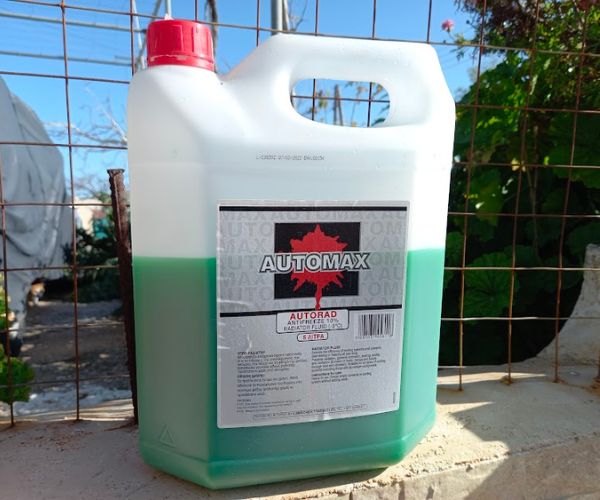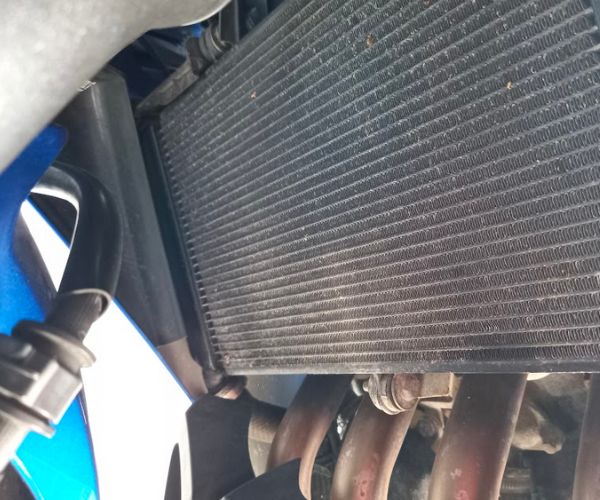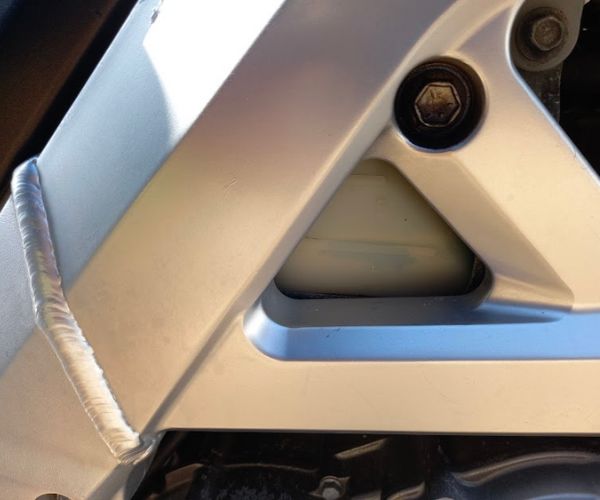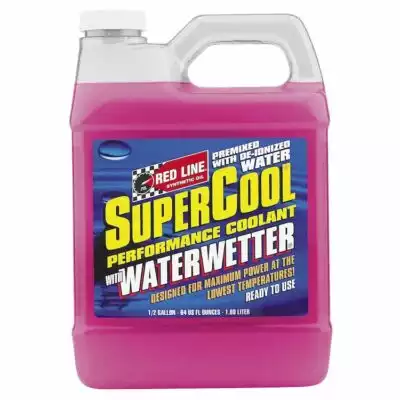You might think that engine coolant is the same for cars and motorcycles, but there are significant differences.
While some coolants designed for cars may be okay in motorcycle engines, many are not, so it’s best to use the coolant recommended by your motorcycle manufacturer.

What Does Motorcycle Coolant Do?
The clue is in the name. In water-cooled engines, we use coolant to remove excess engine heat. Without it, your engine would overheat.
Your cooling system is a combination of various parts:
- Coolant
- A water pump that circulates the coolant around the system
- A radiator that removes heat from the coolant by passing the hot liquid through a mesh of small pipes cooled by the airflow through them
- A thermostat that regulates coolant flow based on your motorcycle-engine temperature
- A cooling fan that is often included, particularly on fully faired bikes where the radiator airflow is restricted
- External pipework that connects the components


But your motorcycle’s coolant doesn’t only keep your engine from overheating; it provides other benefits. Coolants like RedLine Super Cool Engine Coolant improve performance over plain antifreeze products.
Corrosion Inhibitor
Manufacturers produce modern motorcycle engines from lightweight aluminum alloys. This is a much lighter material than traditionally used cast-iron blocks, reducing the engine’s weight significantly.
However, aluminum is more prone to oxidation when in contact with water, and your coolant will contain antioxidant additives, such as silicates and phosphates.
Without the additives, rust will quickly develop within the cooling system, reducing water flow, increasing engine temperature, and ultimately damaging the engine.
Antifreeze
Only some people are as lucky as me to live on a Mediterranean island where temperatures rarely go below freezing. If you live somewhere temperatures are likely to drop below freezing point, your cooling system must include antifreeze technology.
Modern coolants can prevent an engine from freezing to around -34°C (-29°F), which is impressive.
What Are the Differences Between Motorcycle and Car Engine Coolants?
Car and motorcycle engine technologies differ in the materials used, which means your coolant must be specific for your engine type.
Some additives can damage motorcycle engine components, so choosing the correct coolant is essential.
There are two main types of motorcycle engine coolants: propylene glycol-based coolants and ethylene-based coolants.
Propylene Glycol
Propylene glycol coolants use organic-acid technology (OAT) and are the best solution for motorcycle coolants. The organic acids give natural rust prevention and a prolonged lifespan for the coolant, and they are suitable for steel, cast iron, and aluminum engines.
A significant advantage of propylene glycol coolants is that they are not toxic and are kinder to the environment. These coolants are typically green or orange in color.
Ethylene Glycol
Ethylene glycol coolants use an extended version of the OAT formulation called hybrid organic-acid technology (HOAT).
You must be careful here, as HOAT technology coolants can contain phosphates and silicates, which could damage your motorcycle engine. Nitrate, amine, and phosphate-free (NAP-free) HOAT coolants are suitable for motorcycle engines as they are low-silicate alternatives.
Can You Mix Different Coolants?
Do not be tempted to mix OAT- and HOAT-type coolants. The coolants are not compatible with each other and may react, causing damage to your motorcycle engine.
If you accidentally mix the two types of coolant, you must flush your cooling system thoroughly and refill it with just one type.
Can Car Engine Coolant Damage Your Motorcycle Engine?
Yes, definitely. Coolant designed for car engines will almost certainly contain silicates that can damage a motorcycle engine. Always use a coolant designed for motorcycle engines, such as Maxima Coolanol Coolant.
